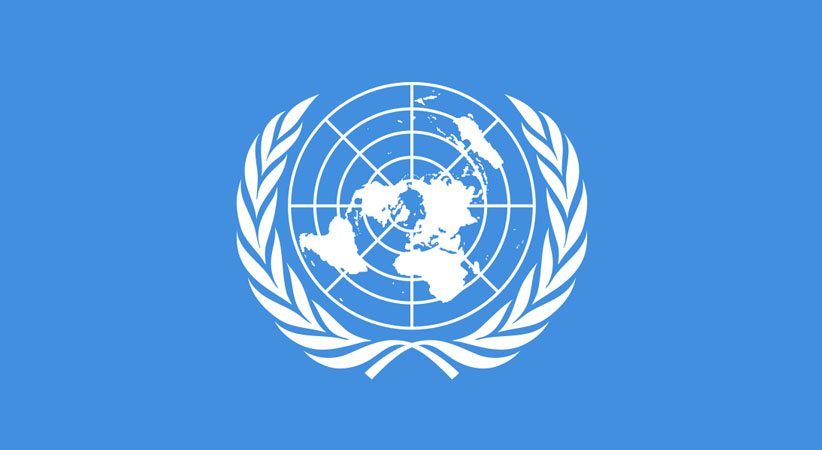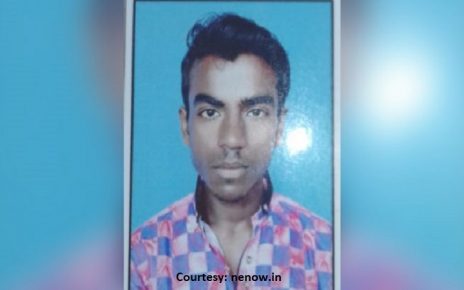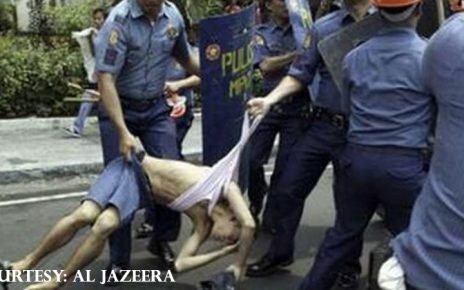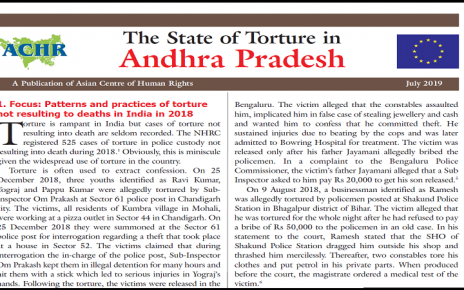In May 2018, the UN bodies took a number of actions for the prevention of torture.
A. UN Committee Against Torture: Tajikistan
On 18 May 2018, the UN Committee against Torture (UNCAT) concluded its sixty-third session during which the Committee adopted concluding observations and recommendations on Belarus, Czech Republic, Norway, Qatar, Senegal and Tajikistan on the implementation of the provisions of the Convention against Torture and Other Cruel, Inhuman or Degrading Treatment or Punishment.
After considering the third periodic report of Tajikistan (CAT/C/TJK/3) on 4 and 7 May 2018, the Committee Against Torture expressed concerns at allegations that torture and ill-treatment continue to be routinely practiced by law enforcement officials and at the data provided by Tajikistan indicating that while 89 complaints of torture had been received by the Office of the Procurator General since the Committee’s previous review in 2012, only four individuals were criminally convicted of torture under article 143(1) of the Criminal Code, and that none of the sentences received by these individuals exceeded three and a half years’ imprisonment.
The Committee also expressed deep concerns over cases of alleged torture that have not resulted in criminal prosecutions, including the death in police custody of Umar Bobojonov and the alleged torture of Djovijon Khakimov while being held in incommunicado detention at the Ministry of Internal Affairs Department on organized crime in January 2017. The Committee said the efforts of existing mechanisms have not led to satisfactory results in these and other cases.
The Committee expressed concerns that the Criminal Code continues to provide for inappropriately low penalties for torture; that as a result of these low sanctions, the Criminal Procedure Code allows officials to terminate investigations into torture allegations “on the basis of repentance, conciliation with the victim, [or] change of circumstances”.
The Committee was concerned at reports of several instances of death in custody, including suicides and the deaths that occurred due to high incidence of tuberculosis and HIV/AIDS among prisoners. The Committee also remained concerned about the outcomes of the investigation into the deaths of three persons: Kurbon Mannonov, Nozimdshon Tashirpov and Ismonboy Boboev.
Further, the Committee expressed deep concerns at allegations it has received that despite the fact that the State party’s legislation indicates that confessions obtained by torture are to be declared inadmissible as evidence of guilt, the courts do not implement this legislation in practice.
The Committee reiterated its earlier recommendation (CAT/C/TJK/CO/2, para. 9) that the State party should act urgently to combat a culture of impunity for torture and ill treatment, including by ensuring that high-level government officials publicly and unambiguously affirm that torture will not be tolerated and that prosecutions will be initiated against anyone committing acts of torture or complicit or acquiescent in torture, including those with command responsibility.
The Committee further urged the State party, among others, to (1) undertake a review of court cases in which defendants alleged that a confession presented as evidence of their guilt was obtained through torture or other ill-treatment; (2) establish a separate investigative mechanism or unit that is capable of carrying out effective criminal investigations and prosecutions of allegations of torture and ill-treatment committed by public officials; (3) promptly, effectively and impartially investigate all incidents and allegations of torture and ill-treatment, prosecute those who are found to be responsible and report publicly on the outcome of such prosecutions; (4) investigate promptly, thoroughly and impartially all incidents of death in custody, ensure independent forensic examinations; provide autopsy reports to the family members of the deceased and prosecute those responsible for violations of the Convention resulting in such deaths and, if they are convicted, punish them accordingly and provide compensation and redress to relatives of victims; (5) the State party should also take measures to ensure that officials are not permitted by the Code of Criminal Procedure to terminate investigations into the crime of torture because the perpetrator has repented or reconciled with the victim; and (6) the State party should enable the Commissioner for Human Rights (Ombudsman) to access all places of detention and to make his reports publicly available on a regular basis, including through a website, and the independence and efficiency of the Ombudsman’s office should be strengthened by ensuring adequate financial and staffing resources to enable it to carry out its mandate effectively and independently, in compliance with the Paris Principles.
B. UN Subcommittee on the Prevention of Torture urges Belize to establish national preventive body
The UN Subcommittee on Prevention of Torture and other Cruel, Inhuman or Degrading Treatment or Punishment (“SPT”) established under the Optional Protocol to the UNCAT (OPCAT) is the new mechanism with the preventive mandate focused on an innovative, sustained and proactive approach to the prevention of torture and ill treatment. The SPT started its work in February 2007.
During the visit to Belize on 22- 28 April 2018, the SPT delegation visited the central prison, various police stations throughout the country, as well as a juvenile institution, where members of the delegation freely interviewed staff as well as people deprived of their liberty. The SPT delegation also met with members of civil society and held meetings with government ministers, the Chief Justice, and the Ombudsman.
In a statement released on 4 May 2018, the SPT said Belize must establish an independent national preventive mechanism to avert and deter torture and ill-treatment of people deprived of their liberty.
“Belize should strive to establish a national preventive body as soon as possible, ensuring that it is functionally independent, adequately resourced and mandated to carry out unannounced visits to places where people are deprived of liberty,” stated Sir Malcolm Evans, who headed the SPT delegation. “When the national preventive mechanism is established, it will help the authorities improve the conditions of detention and ensure an effective policy for preventing torture and ill-treatment in the country,” he further added.
A National Preventive Mechanism is an independent national body with power to regularly examine the treatment of persons deprived of their liberty in places of detention, and to subsequently make recommendations to the authorities. States parties to the Optional Protocol to the UNCAT (OPCAT) which Belize acceded to in 2015, must establish such a mechanism within a year of ratification. Belize has not yet done so.
The SPT will submit a confidential report to the Government of Belize containing its observations and recommendations and will encourage the government to make the report public.
The SPT Delegation was composed of the following members: Sir Malcolm Evans, Head of Delegation (United Kingdom of Great Britain and Northern Ireland), Mr. Arman Danielyan (Armenia), Ms. June Lopez (Philippines), Ms. Aisha Shujune Muhammad (Maldives) and Mr. Victor Zaharia (Republic of Moldova).
C. UN Special Rapporteur on Torture concludes visit to Argentina
UN Special Rapporteur on torture and other cruel, inhuman or degrading treatment or punishment, Mr. Nils Melzer, and his team visited Argentina from 9-20 April 2018 to assess the prevailing situation and challenges in the country concerning the prohibition of torture and other cruel, inhuman or degrading treatment or punishment. The delegation visited the City of Buenos Aires as well as the provinces of Buenos Aires, Córdoba and Formosa. The delegation enjoyed “unrestricted freedom of movement and access to all places where people are deprived of their liberty and were able to meet with and interview male, female and juvenile inmates in private, in full compliance with the terms of reference of my mandate”.
Following the visit, the UNSR presented preliminary observations and recommendations some of which are briefly described below:
The UNSR on Torture reiterated the concerns expressed by the Committee against Torture regarding the lack of conformity of the definition of torture as provided under Article 144 the of the Criminal Code with the provisions of Article 1 of the UNCAT. The UNSR urged the authorities to take the necessary measures to ensure the comprehensive criminalisation of torture in full compliance with Argentina’s obligations under UNCAT.
The UNSR said that Argentina was one of the first States to ratify the OPCAT in 2004 but it took until 2012 for the National Preventive Mechanism (NPM) to be established at the federal level, its members were designated only in December 2017, and the funds allocated to it still have not been fully made available. Moreover, of the 24 local mechanisms which are to assume the NPM’s function at the level of the provinces and the capital city, only five have been established so far, and there seems to be no realistic prospect of the remaining ones to become operational in the near future.
Therefore, the UNSR noted with serious concern that 14 years after the ratification of the OPCAT, the NPM required by that treaty still does not exist in practice for the vast majority of persons deprived of their liberty throughout Argentina.
The UNSR’s report noted that “Institutional violence by security forces and prison officials seems to be widespread, and impunity rampant. The forensic expert who accompanied my visit conducted a number of medical examinations of inmates, some of which confirmed physical injuries consistent with the testimonies received”.
The UNSR received numerous consistent allegations of police violence during peaceful demonstrations against forced evictions during his meetings with members of indigenous communities and inhabitants of marginalized neighbourhoods or temporary housings in the provinces of Formosa and Cordoba and the city of Buenos Aires.
In some detention facilities, the UNSR heard consistent accounts of physical and psychological abuse being inflicted on detainees as a means of punishment for misbehaviour or even as a reprisal for having complained about their conditions of detention. Most notably, numerous detainees in Cruz del Eje provincial prison reported having been severely beaten while being shackled to metal beds for several days, or having been held in stress positions in isolation cells for prolonged periods of time. Similarly, in Bouwer prison, detainees reported to have been shackled or handcuffed by their feet and/or hands for periods between several hours and three days. Many of the alleged victims of torture and ill-treatment told the UNSR that the complaints they filed were rarely investigated.
The UNSR reported that in many provincial police stations and penitentiaries, detention conditions “are totally incompatible with human dignity and may amount to torture and other cruel, inhuman or degrading treatment or punishment”. Apart from overcrowding and unhygienic conditions, many inmates complained about insufficient quantity and poor quality food, particularly in police custody, where the meals provided were clearly insufficient to maintain an adequate level of nutrition.
The UNSR made a number of recommendations to the Argentinean authorities to take all necessary measures to combat torture in the country.
D. Other UN rapporteurs’ action against torture
UN human rights experts urge Spain to halt extraditions to China fearing risk of torture or death penalty[1]
On 18 May 2018, UN human rights experts criticised Spain’s decision to extradite Chinese individuals to the People’s Republic of China where they face fraud charges and may be exposed to the risk of torture, other ill-treatment, or the death penalty. In December 2016, Spanish authorities arrested 269 Chinese individuals, including 219 from Taiwan, province of China, over their alleged involvement in telecom scams to defraud Chinese citizens. Two individuals were extradited to China on 17 May 2018, and the experts fear that others will be deported soon.
The UN experts urged Spain to halt the process of deporting these individuals, and to immediately review the extradition decision with a view to ensuring the full respect of its international human rights obligations including under the ICCPR and the UNCAT.
Bahrain: UN rights experts condemn military court convictions, cite torture allegations[2]
On 30 April 2018, several UN human rights experts in a joint statement condemned the death sentences awarded by a military court in Bahrain to four men and demanded their retrial on the ground that they were denied fair trial and confessions were obtained under torture.
The men, Mohamed AbdulHasan AlMutaghawi, Fadhel Sayed Radhi, Sayed Alawi Husain and Mubarak Adel Mubarak Mahanna, were sentenced to death by the Bahraini High Military Court on 25 December 2017 on charges of participating in a terrorist cell and attempting to assassinate Bahrain’s Defence Forces Commander-in-Chief. Two others facing the same charges were sentenced in absentia. All of them in addition had their citizenship revoked. Their appeals were rejected by the Bahraini Military Court of Cassation on 25 April 2018.
Prior to their conviction, the men were allegedly held in solitary confinement in small cells for a prolonged period and subjected to torture and ill-treatment to obtain confessions which were then used against them in court. They did not have access to legal representation until late in the trial proceedings and the court reportedly refused to investigate the defendants’ allegations of torture in custody.
Later the King of Bahrain commuted the death sentences to life imprisonment which the UN experts welcomed but they demanded a retrial and thorough investigations into allegations of enforced disappearance and torture with a view to holding those responsible to account and preventing future similar occurrences. The UN experts called on the King of Bahrain to reverse the amendment.
ENDNOTES:
[1]. UN human rights experts urge Spain to halt extraditions to China fearing risk of torture or death penalty, OHCHR, 18 May 2018
[2]. Bahrain: UN rights experts condemn military court convictions, cite torture allegations, OHCHR, 30 April 2018




